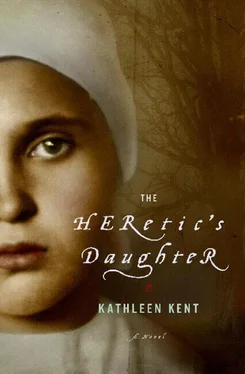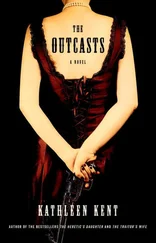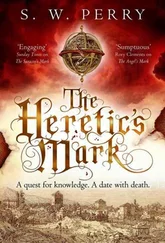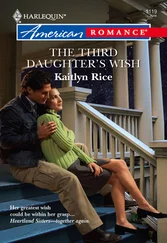Yours, in God’s gracious care, And ever-loving, Grandmother, Sarah Carrier Chapman
CHAPTER ONE
Massachusetts, December 1690
THE DISTANCE BY wagon from Billerica to neighboring Andover is but nine miles. For myself it was more than a journey away from the only home I had ever known. It was the ending of a passage from the dark fog of infancy to the sharp remembrances of childhood. I was nine years of age on that December day and my entire family was going back to live with my grandmother in the house where my mother was born. We were six in all, cramped together in an open wagon, carrying within my mother and father, two of my older brothers, myself, and Hannah, who was but a baby. We had with us all of our household possessions. And we were bringing, unbeknownst to any of us, the smallpox.
A plague of it had swept across the settlements of Middlesex County, and with our crossing east over Blanchard’s Plain, contagion and death followed with us. A close neighbor, John Dunkin of Billerica, had died within the space of one week, leaving a widow and seven children. Another neighbor brought us the news, and before the door could close on the messenger, my mother had started packing. We had thought to outrun the pox this time. My father had bitter memories of being blamed for bringing the pox into Billerica many years before. He always said it was because he was a Welshman and a stranger to the town, even after living there for so many years, that he stood accused. But the disease crept along with us like a pariah dog. It was my older brother Andrew who would be the first to succumb. He carried the seeds of sickness within him, and from him it would spread to our new town of residence.
It was deep into the season and so bitterly cold, the liquid from our streaming eyes and noses froze onto our cheeks like frosted ribbons of lace. All of us had dressed in every bit of clothing that we possessed and we pressed tightly together for warmth. The crudely hewn boards of the wagon had been covered with straw, and my brothers and I had wrapped it around us as best we could. The draft horse labored under his load, for he was not a young gelding, and his breath steamed in great puffs into the air. His coat was as woolly as any bear’s and encrusted with a forest of icicles that hung down sharply from his belly. Richard, my oldest brother, was not with us. He was near a man at sixteen and had been sent ahead to help ready the house for our arrival, bringing provisions strapped across the back of our one remaining ox.
Father and Mother sat at the front of the wagon silent, as was their habit. They rarely spoke to each other in our presence and only then of weights and measures and time delineated by the seasons. The language of field and home. He often deferred to her, which seemed remarkable, as he towered over my mother. Indeed, he towered over everyone. He was close to seven feet tall, so it was said, and to me, being a small child, his head seemed to rest in the clouds, his face forever in shadow. He was forty-eight years of age when he married my mother, so I had always thought of him as an old man, even though he carried himself erect and was fleet of foot. Thomas Carrier, so the gossip went, had come from old England as a young man to escape some troubles there. As my father never spoke of his life before marrying, and for truth said hardly a word regarding anything at all, I did not know his history before he plied his trade as farmer in Billerica.
I knew only two things for certain of his past. The first was that my father had been a soldier during the civil wars of the old England. He had a red coat, old and battered and faded to rust, which he had brought with him from London. One arm was torn, as though slashed through with something sharp, and Richard had told me that, but for the padded lining in the sleeve, Father would have lost an arm for sure. When I pressed Richard for more of the story as to how and where Father had fought, my brother would purse his lips and say, “Ah, but you’re only a girl and cannot know the ways of men.” The other thing I knew was that men feared him. Often behind my father’s back they would gesture secretly to one another a peculiar signal. A thumb passed over the neck from one side to the other as if to sever their heads from their bodies. But if Father ever saw these gestures, he gave them no notice.
My mother, who was Martha Allen before marrying, sat next to him, holding Hannah, only one year old. She was wrapped into a shapeless bundle and held loosely like a package. I remember watching my little sister with the cruel fascination of a child, wondering when she would topple out of the wagon. We had lost a baby sister, Jane, years before and my lack of close affection could have been for fear that this baby would die as well. The first year was so fragile that some families did not name their child until the child was past twelve months and more likely to live. And in many households if a baby died, that same baby’s name would be passed on to the next born. And to the very next if that babe died as well.
At times I suspected my mother had no tender feelings for any of us, even though we were as different from one another as children could be. Richard was very much like Father: tall, silent, and as impenetrable as the rocks in Boston Bay. Andrew, the next oldest, had been a sweet child and cheerfully willing to work, but as he grew, he stayed rather slow in thought and often my mother lost patience with him. Tom, the third son, was closest to me in years and closest to my heart. He was quick and bright, his humors running hot and restless like mine, but he was often afflicted with attacks of labored breathing and so, at the times of seasons’ changing, had not much strength to work in the field or barn. I was next in age, stubborn and willful, I was often enough told, and thus not easily loved. I approached the world with suspicion, and because I was not pretty or pliable, I was not doted upon. I often challenged my betters and was therefore often chastised vigorously with a slotted spoon we children had named Iron Bessie.
It was my manner to openly stare at the people around me, despite knowing how this discomforted them, especially my mother. It was as though my staring robbed her of some essential part of herself, some part that she held in reserve even from those closest to her. There was hardly a time when we were not eating or sleeping or working together, and so we were expected to give quarter in this regard. She loathed my staring so greatly that she would work to catch me at it, and if I could not look away before she turned to me, she would use Iron Bessie on my back and legs until her wrist gave out. And as her wrists were as strong as any man’s, this took some time. But in this way, I came to witness so much that others did not see. Or did not wish to see.
It was not defiance only that made me study her so, although our cat-and-mouse games did become a kind of battle. It was also because she, with a deliberation bordering on the unseemly, set herself apart from what a woman should be and was as surprising as a flood or a brush fire. She had a will, and a demeanor, as forceful as a church deacon’s. The passage of time, and layer upon layer of misfortune, had only worked to stiffen the fabric of her being. At first glance, one might perceive a comely woman of some intelligence, not young, but neither yet old. And her face, when not animated by speech or untempered passions, seemed serene. But Martha Carrier was like a deep pond, the surface of which was placid enough but deeply cold to the touch and which was filled beneath the surface with sharp rocks and treacherous choke roots. And she had a tongue, the sharpness of which would gut a man as quick as a Gloucester fisherman could clean a lamprey eel. I know I was not alone in my family, or amongst our neighbors, in fervently praying for a beating rather than having to endure the lacerations of her speech.
Читать дальше












